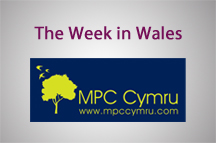 In Scotland the politics is noisy. In England it is too. In Wales this week, the volume dipped a little as each party started to consider their expectations for the 2016 Assembly election.
In Scotland the politics is noisy. In England it is too. In Wales this week, the volume dipped a little as each party started to consider their expectations for the 2016 Assembly election.
Owen Smith and Carwyn Jones have watched the UK and then Scottish Labour leaders fall. Understandably, they are not actively seeking a high profile while carrying out their respective jobs this week. The result for Labour in Wales was poor too, but not to such a degree that serious questions were being asked of their positions. However, with Labour gains not materialising in 2015, is there a realistic hope of them happening in 2016? And what of the now four constituencies with a Labour AM but a Tory MP? Labour have also suffered recent setbacks in local government, losing the leadership of Carmarthenshire and limping through their own internal battles in the ongoing tumult which is the current administration in Cardiff.
 The Conservatives have now consolidated their position as Wales’ second party, but with their General Election success, comes heightened expectation. For example, should their leader Andrew RT Davies stand in his home constituency of Vale of Glamorgan where Labour’s Jane Hutt has held off all-comers in the supposedly marginal seat? In addition, they face the difficulty of actually increasing their number. In most regions, a constituency victory would mean the loss of a regional member. South Wales Central offers their best opportunity to add one to their total. This week the Welsh Tories had the first of two new faces join them in the Senedd. Dr Altaf Hussain, a former NHS Consultant Orthopaedic Surgeon, replaces Byron Davies MP as South Wales West AM. The Labour loss to the Conservatives in Vale of Clwyd on 7th May was put down in large part to the effective campaign of Dr James Davies against Labour’s NHS policy making. As such, the last thing the Labour AMs will have wanted to see was the arrival of a new Conservative AM, who will be able to share his own experiences of working in the NHS while scrutinising policy.
The Conservatives have now consolidated their position as Wales’ second party, but with their General Election success, comes heightened expectation. For example, should their leader Andrew RT Davies stand in his home constituency of Vale of Glamorgan where Labour’s Jane Hutt has held off all-comers in the supposedly marginal seat? In addition, they face the difficulty of actually increasing their number. In most regions, a constituency victory would mean the loss of a regional member. South Wales Central offers their best opportunity to add one to their total. This week the Welsh Tories had the first of two new faces join them in the Senedd. Dr Altaf Hussain, a former NHS Consultant Orthopaedic Surgeon, replaces Byron Davies MP as South Wales West AM. The Labour loss to the Conservatives in Vale of Clwyd on 7th May was put down in large part to the effective campaign of Dr James Davies against Labour’s NHS policy making. As such, the last thing the Labour AMs will have wanted to see was the arrival of a new Conservative AM, who will be able to share his own experiences of working in the NHS while scrutinising policy.
Plaid Cymru has undergone a change too. Jonathan Edwards MP has been elected to lead their UK Parliamentary group. The failure to take target seats in Ynys Môn and Ceredigion, as well as the party losing ground to Labour in Llanelli, was not the result that had been hoped for after Leanne Wood had grown into a confident media performer on the national stage during the General Election campaign. The caveat for Plaid is, of course, that they perform better at Assembly elections. Nonetheless, with the party polling in 4th place there is nervousness and, with Adam Price returning to the fold next year, there will be options for an alternative path if Leanne Wood cannot lead the party to make gains.
Even UKIP are quiet. Not the normal state for the party. The confusion over Nigel Farage’s non-resignation and the ructions caused among the hierarchy of UKIP have, for the moment at least, taken the momentum away from the self-proclaimed “people’s army”. Having not expected a Conservative majority, UKIP now have to re-evaluate their purpose in politics when an EU referendum is upcoming, as opposed to a distant issue to campaign for. Nathan Gill has proven a strong media performer and his silence will be short-lived, but where do UKIP pitch their target for 2016 having hugely over-stated their chances in England this year?
The relative quietness of Wales will not last, but just for the moment each party is contemplating the ramifications of the election gone and the campaign ahead.














